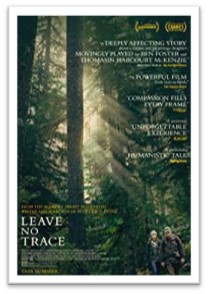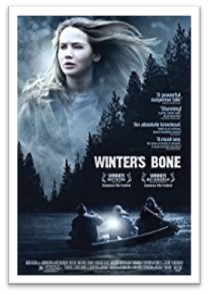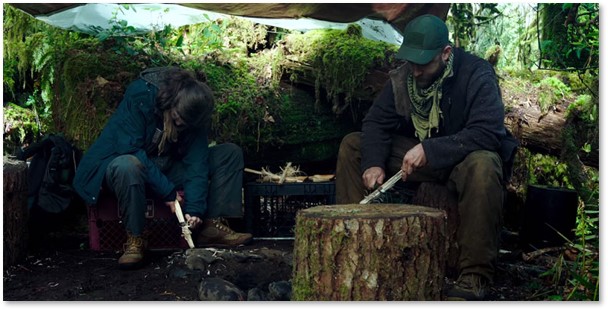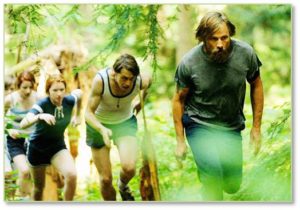 Last week we saw Leave No Trace, an excellent movie about a traumatized veteran raising his daughter alone in the woods. I had high hopes because this film was directed by Debra Granik and written by Anne Rosselini, the same team that created the superb Winter’s Bone. That 2010 movie gave us an incredible performance by then-unknown Jennifer Lawrence as Ree Dolly. Ree is a model of female strength, supporting her kid brother and depressed mother even though she’s only 17.
Last week we saw Leave No Trace, an excellent movie about a traumatized veteran raising his daughter alone in the woods. I had high hopes because this film was directed by Debra Granik and written by Anne Rosselini, the same team that created the superb Winter’s Bone. That 2010 movie gave us an incredible performance by then-unknown Jennifer Lawrence as Ree Dolly. Ree is a model of female strength, supporting her kid brother and depressed mother even though she’s only 17.
Winter’s Bone never got the visibility or the box office that it deserved and I’m sorry to see that Leave No Trace is following the same path. Inadequate distribution, poor marketing, and low critical coverage will doom it to disappear far sooner than it should. This despite a 100% Fresh score on Rotten Tomatoes from the critics who did see it and 87% Liked from viewers.
Leave No Trace
Leave No Trace gives us Ben Foster as will, a PTSD-haunted veteran incapable of living among people. He’s raising his daughter, Tom, played by Thomasin Harcourt-McKensie, in Portland’s Forest Park, an enormous and heavily forested expanse. It appears more like wilderness than urban park. They live off the grid and, to some extent, off the land.
Although their existence is crude and lacking in comfort or convenience, they are happy. Other damaged people also live in the park, making the unspoken point that shelters do not answer all needs and we can’t force people into a civilization with which they can’t cope.
When that civilization intrudes, Will struggles against his demons to give his daughter a good life. More often than not, he loses that struggle, taking them ever deeper into real wilderness. His trauma drives him to be alone and remote, leaving no trace on society. Finally, Tom realizes that “I don’t have the same problem you have” and makes her own choices.
Leave No Trace is the gripping movie I expected from the team of Granik and Rosselini.. (Watch the trailer) I rooted for Will at the same time I criticized him for not trying ha rder or realizing the dangers to which he exposes his daughter. Easy for me to say. I don’t have PTSD and the sound of helicopters doesn’t drive me into a fugue state.
Captain Fantastic
As I left Leave No Trace, I found myself thinking about another movie in which a father rejects society and takes his family off the grid. Captain Fantastic came out in 2016 and soon disappeared, also under-viewed and unappreciated. Here’s the premise:
Deep in the forests of the Pacific Northwest, isolated from society, a devoted father (Viggo Mortensen) dedicates his life to transforming his six young children into extraordinary adults. But when a tragedy strikes the family, they are forced to leave this self-created paradise and begin a journey into the outside world that challenges his idea of what it means to be a parent and brings into question everything he’s taught them.
Granted, this one suffered from the worst title anyone could give a movie that doesn’t involve a superhero in a spandex suit. I know movie lovers who automatically assumed that Captain Fantastic was nothing they would ever want to see based on the title alone.
With better marketing, it could have succeeded. Captain Fantastic had several A-list stars: Viggo Mortensen as Ben and Frank Langella as his father in law, Jack. It scored 83% Fresh and 85% Liked on Rotten Tomatoes. (Watch the trailer)
The Fantasy of Life Off the Grid
I had more trouble believing this basic story, however. Ben and his wife, who is in the hospital, homeschool the kids with a vigorous physical and intellectual education. Some might argue that it’s too challenging but these kids are up to it. They can race through the woods, hunt, skin animals, and recite the Declaration of Independence. It’s all good.
As positive as this lifestyle appears, it presents us with a fantasy. In this modern version of nostalgie de la boue (nostalgia for the mud ):
- The kids all love their life and follow Dad’s instructions without argument.
- The kids never need medical care other than first aid, or get a cavity.
- They are all well dressed, healthy and strong.
- A couple can feed eight people by hunting and living off the land.
- They can, simultaneously, teach six children all they need to know.
A Subsistence Existence
In reality, however, living off the land is hard—very hard. I’ve watched enough episodes of Survivorman and Alone to see just how difficult it can be to provide shelter, warmth, food, and clean water for one person, never mind a family. That’s why our ancestors gathered into tribes.
In the wilderness, you need other adults to fish and hunt together, to keep the fires burning, to carve canoes and make tools, to watch the children and fight off predators. Otherwise, you fall into a subsistence existence, one in which you work hard every day just to survive. Subsistence living leaves no time for studying or reading or philosophy and it sucks up all your energy.
 Morning exercises become an artifact of civilization, one that requires energy you just can’t afford.
Morning exercises become an artifact of civilization, one that requires energy you just can’t afford.
Both Leave No Trace and Captain Fantastic are good movies. If you can find the former in the theater or the latter on cable, check them out. (And don’t forget Winter’s Bone.) I guarantee that you will enjoy watching them a lot more than you would enjoy huddling in a tent in the pouring rain, bathing in an ice-cold stream, or eating squirrel on a spit for dinner. Again.


